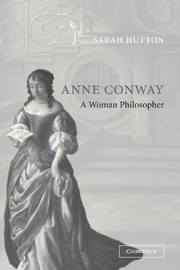Book contents
- Frontmatter
- Contents
- Acknowledgements
- Introduction
- 1 Anne Finch, Viscountess Conway
- 2 A philosophical education
- 3 Religion and Anne Conway
- 4 Anne Conway and Henry More
- 5 John Finch, Thomas Hobbes and Margaret Cavendish
- 6 Experimental physick: Boyle, Greatrakes, Stubbe
- 7 Physic and philosophy: Van Helmont, father and son
- 8 Kabbalistical dialogues
- 9 Quakerism and George Keith
- 10 Last years
- 11 Legacy
- Bibliography
- Index
9 - Quakerism and George Keith
Published online by Cambridge University Press: 22 September 2009
- Frontmatter
- Contents
- Acknowledgements
- Introduction
- 1 Anne Finch, Viscountess Conway
- 2 A philosophical education
- 3 Religion and Anne Conway
- 4 Anne Conway and Henry More
- 5 John Finch, Thomas Hobbes and Margaret Cavendish
- 6 Experimental physick: Boyle, Greatrakes, Stubbe
- 7 Physic and philosophy: Van Helmont, father and son
- 8 Kabbalistical dialogues
- 9 Quakerism and George Keith
- 10 Last years
- 11 Legacy
- Bibliography
- Index
Summary
‘this Light, Seed, Life, and Word’
Probably the best-known fact about Anne Conway's personal spirituality is that she died a Quaker. Her conversion took place late in her life – sometime between 1677 and 1678. For a woman of her class, this was a momentous choice, made in direct opposition to the views of her immediate family and of her mentor, Henry More. Her ‘convincement’ followed that of her other key mentor, Francis Mercury van Helmont, who, as we have already noted, was instrumental in bringing her into contact with the Society of Friends. However, her conversion was not a sudden or unexpected event, but must be seen in relation to the religious route which extends back through her life to her earlier interest in religious dissent and illuminist spirituality. Her interest in Quakerism was most intense during the years 1674–9, and overlaps with her investigations of kabbalism, apocalypticism and heterodox Christianity. A rich texture of these religious topics fills her correspondence in the 1670s. If more letters of hers were extant, it would be easier to judge whether this represents a new intensity in her religious curiosity or a continuation of longer-term involvement with radical spirituality. These later letters are, of course, particularly important, because her philosophical treatise was written at the end of this period, against this background.
In this chapter, I shall focus particularly on the route that led her to Quakerism, and on the important role of the Scottish Quaker leader, George Keith.
- Type
- Chapter
- Information
- Anne ConwayA Woman Philosopher, pp. 177 - 202Publisher: Cambridge University PressPrint publication year: 2004



